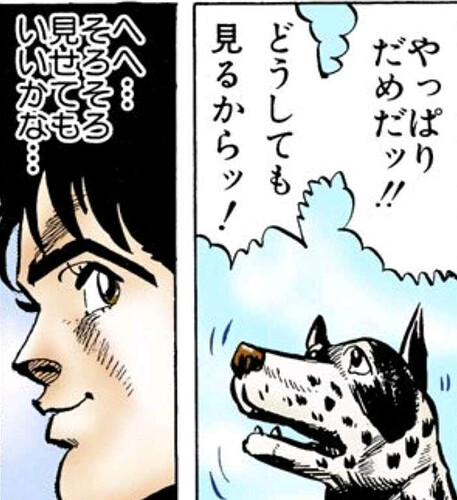JoJo and his girl are arguing here, him on the right and she on the left. He doesn’t want to show her the heart he carved into a tree. Anyway, I was told by that this から isn’t the から that means because. What does it mean?
Nah I don’t think that’s what this is. 見る is the main verb here, it’s not part of an adverb like in the 見るから you mentioned
I do believe it is sort of related to the use of から meaning “because” in that it is thought to be derived from that “inverted” use where you have the main clause first and then the reason following (thus leaving you with a seemingly hanging/sentence-ending から at the end of the subordinate clause).
However, here it is mostly used to show strong determination/assertion, rather than illustrate a clear cause/reason for something.
See the dictionary entry for the conjunctive particle から, specifically the 2nd definition where it’s used as a sentence-ending particle:
![]() [接助]活用語の終止形に付く。
[接助]活用語の終止形に付く。
1 理由・原因を表す。「もう遅い―帰ろう」
「年号が変はった―、暦はもらはずはなるまい」〈咄・聞上手〉
2 (終助詞的に用いて)強い主張、決意を表す。ぞ。「思い知らせてやる―」
I feel like the kara is a bit like an inflection (is that the right word? lol) much like the use of kedo often is as a sentence ender.
なんて賢しい!Perhaps I should use Japanese dictionaries more often. Is it correct that one of the listed uses in the second part of the definition states it can be a replacement for ぞ, simply adding force to the statement?
I think it could be, depending on the context. But I don’t think it’s always interchangeable with ぞ specifically (よ or さ might work better in some contexts). It really works in the example they give because it’s a very forceful statement of determination/resolution. “(Just you wait,) I’ll show you [I’ll make you realize your mistake].”
But in some cases, the speaker might not be trying to express their resolve, rather, they want to relay some information to the listener so as not to cause a misunderstanding or get the listener to realize something. You might see this as からね (or からな), especially. It’s fairly assertive, but it’s not always particularly forceful (especially with ね attached)
There are some good examples I’ve found in these links:
Like Beghaus is saying, I think it’s very similar to the use of けど as a sentence-ender in that often there’s some meaning left unsaid. It still has that tinge of saying "because … " but the speaker is purposely letting the subordinate clause stand on its own.
Some more example sentences I’ve found:
・私、絶対に彼と結婚するんだから。(決意)
・こっちが甘い顔をすると、すぐ調子にのるんだから。
・あの男ときたら、まったく酒癖が悪いんだから(困ったやつだ)。

